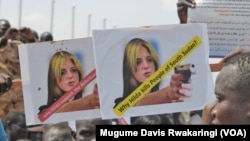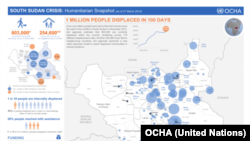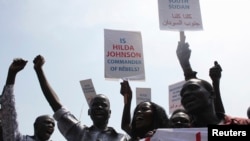JUBA —
South Sudan reacted defiantly to a statement by leading western governments calling on the government and opposition groups to stop obstructing U.N. operations and harassing U.N. staff in the war-torn country, saying the government has the right to monitor the world body's activities on its soil.
Foreign Affairs Ministry spokesman Mawien Makol Arik said the government began stopping and checking U.N. vehicles only after the discovery early this month of weapons in a U.N. convoy bound for Bentiu in Unity state. Arik insisted that his government would continue to check U.N. vehicles.
Arik said, however, that he was unaware of U.N. employees being harassed or U.N. property being seized, beyond the weapons that were intercepted.
"The idea now is that we have to see what the U.N. is doing because of these guns that have been seized in Rumbek," Arik told VOA.
"Now, the government is concerned with every activity that the U.N. is doing in terms of loading and transporting and all this," the foreign affairs spokesman said. "You know, we said we should be able to see them now because we wanted to know exactly what the U.N. is carrying in South Sudan."
Arik was reacting to a statement released Friday, in which diplomats from 10 western countries, including the United States, plus the European Union protested the obstruction of U.N. operations, seizure of property, and threats to U.N. personnel in war-torn South Sudan, among other issues.
Arik insisted that the government wants to have good relations with the U.N., but said trust has to be rebuilt first.
"All we are saying is that there may be some elements within the U.N. that are not doing the work they were supposed to be doing," he said.
"Our government is cooperating fully with the United Nations Mission in South Sudan and we are working hand-in-hand," the foreign affairs official said.
Opposition forces 'surprised' by western nations' statement
A spokesman for anti-govenrment forces, Hussein Maar Nyuot, said he was surprised that the strongly worded statement also accused the opposition of interfering with U.N. operations.
"We are actually respecting the humanitarian access and humanitarian laws," he said.
"We want our people to be served by the U.N. agencies and other international agencies," Maar Nyuot said. He claimed it was the government, not opposition forces, that was obstructing U.N. and aid agency access to areas held by anti-government troops.
Aid agencies "have to take permission from Juba and Juba does not give them the permission and this is obstruction," he said. Maar Nyout said those preventing access to people in need ran contrary to the terms of the cessation of hostilities agreement the two sides signed in January.
Relations between the government and U.N. soured when the conflict erupted in mid-December.
As thousands of people streamed into U.N. bases and compounds, seeking protection from the spreading fighting, the government accused UNMISS of sheltering rebels inside its bases.
In January, tensions rose when UNMISS barred Information Minister Michael Makuei Lueth from the U.N. base in Bor.
UNMISS spokeswoman Ariane Quentier said at the time the minister was refused entry because his bodyguards were armed and the U.N. has a strict policy of not allowing weapons into its facilities.
Days after that incident, President Salva Kiir accused the United Nations of seeking to take over South Sudan, speculating that UNMISS may have pushed his former vice president and political rival, Riek Machar, to rise up against him. Kiir dialed back his accusations a few days later.
The seizure of the weapons in the U.N. convoy increased tensions and gave "the government a strong reason to believe the U.N. is not very neutral," said Zacharia Diing Akol of the Sudd Institute, a Juba-based think tank.
Akol said that the western nations that signed last week's statement "should not expect the government to do things in the way they would want them."
"Both sides are being unreasonable," Akol said. But he said the statement could pave the way for broader dialogue between the government, the United Nations and western governments.
Foreign Affairs Ministry spokesman Mawien Makol Arik said the government began stopping and checking U.N. vehicles only after the discovery early this month of weapons in a U.N. convoy bound for Bentiu in Unity state. Arik insisted that his government would continue to check U.N. vehicles.
Arik said, however, that he was unaware of U.N. employees being harassed or U.N. property being seized, beyond the weapons that were intercepted.
"The idea now is that we have to see what the U.N. is doing because of these guns that have been seized in Rumbek," Arik told VOA.
"Now, the government is concerned with every activity that the U.N. is doing in terms of loading and transporting and all this," the foreign affairs spokesman said. "You know, we said we should be able to see them now because we wanted to know exactly what the U.N. is carrying in South Sudan."
Arik was reacting to a statement released Friday, in which diplomats from 10 western countries, including the United States, plus the European Union protested the obstruction of U.N. operations, seizure of property, and threats to U.N. personnel in war-torn South Sudan, among other issues.
Arik insisted that the government wants to have good relations with the U.N., but said trust has to be rebuilt first.
"All we are saying is that there may be some elements within the U.N. that are not doing the work they were supposed to be doing," he said.
"Our government is cooperating fully with the United Nations Mission in South Sudan and we are working hand-in-hand," the foreign affairs official said.
Opposition forces 'surprised' by western nations' statement
A spokesman for anti-govenrment forces, Hussein Maar Nyuot, said he was surprised that the strongly worded statement also accused the opposition of interfering with U.N. operations.
"We are actually respecting the humanitarian access and humanitarian laws," he said.
"We want our people to be served by the U.N. agencies and other international agencies," Maar Nyuot said. He claimed it was the government, not opposition forces, that was obstructing U.N. and aid agency access to areas held by anti-government troops.
Aid agencies "have to take permission from Juba and Juba does not give them the permission and this is obstruction," he said. Maar Nyout said those preventing access to people in need ran contrary to the terms of the cessation of hostilities agreement the two sides signed in January.
Relations between the government and U.N. soured when the conflict erupted in mid-December.
As thousands of people streamed into U.N. bases and compounds, seeking protection from the spreading fighting, the government accused UNMISS of sheltering rebels inside its bases.
In January, tensions rose when UNMISS barred Information Minister Michael Makuei Lueth from the U.N. base in Bor.
UNMISS spokeswoman Ariane Quentier said at the time the minister was refused entry because his bodyguards were armed and the U.N. has a strict policy of not allowing weapons into its facilities.
Days after that incident, President Salva Kiir accused the United Nations of seeking to take over South Sudan, speculating that UNMISS may have pushed his former vice president and political rival, Riek Machar, to rise up against him. Kiir dialed back his accusations a few days later.
The seizure of the weapons in the U.N. convoy increased tensions and gave "the government a strong reason to believe the U.N. is not very neutral," said Zacharia Diing Akol of the Sudd Institute, a Juba-based think tank.
Akol said that the western nations that signed last week's statement "should not expect the government to do things in the way they would want them."
"Both sides are being unreasonable," Akol said. But he said the statement could pave the way for broader dialogue between the government, the United Nations and western governments.






